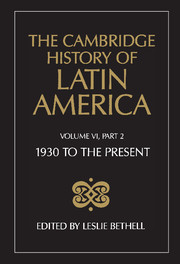Book contents
5 - The urban working class and labour movement in Latin America since 1930
from Part Three - Society and politics
Published online by Cambridge University Press: 28 March 2008
Summary
INTRODUCTION
The use of the term ‘working class’ or ‘proletariat’ in the history of Latin America since 1930 is fraught with difficulty. For some groups of workers, at certain times and places, these terms seem more or less adequate, while for other groups of the working population the phrase ‘working class’ suggests a greater homogeneity of social origin, location in the world of work, and of attitudes and organization than is warranted. The problem is a real, rather than a merely semantic one. In the changing world of work, certain categories or groups of workers came to define themselves, or to be defined by others, as in some sense a ‘working class’, and this cultural definition had consequences for the way they thought about the world and acted it it. Classic examples of this are the working classes of Argentina and Chile, where a strong sense of class identity was linked with clear political orientations. However, this was by no means the modal experience, and many Latin American workers saw themselves in much more diffuse terms either as distinctive elites, separate from the rest of the working population, or as subsumed within a larger social category variously labelled ‘the poor’ or ‘the people’. These diverse forms of social identity (and the struggles over the political and cultural definition of the urban work force) have been a central element in the dynamics of working class and popular organization, and comprise one of the links between the labour movement, narrowly defined, and broader social movements.
- Type
- Chapter
- Information
- The Cambridge History of Latin America , pp. 305 - 378Publisher: Cambridge University PressPrint publication year: 1995
References
- 2
- Cited by



